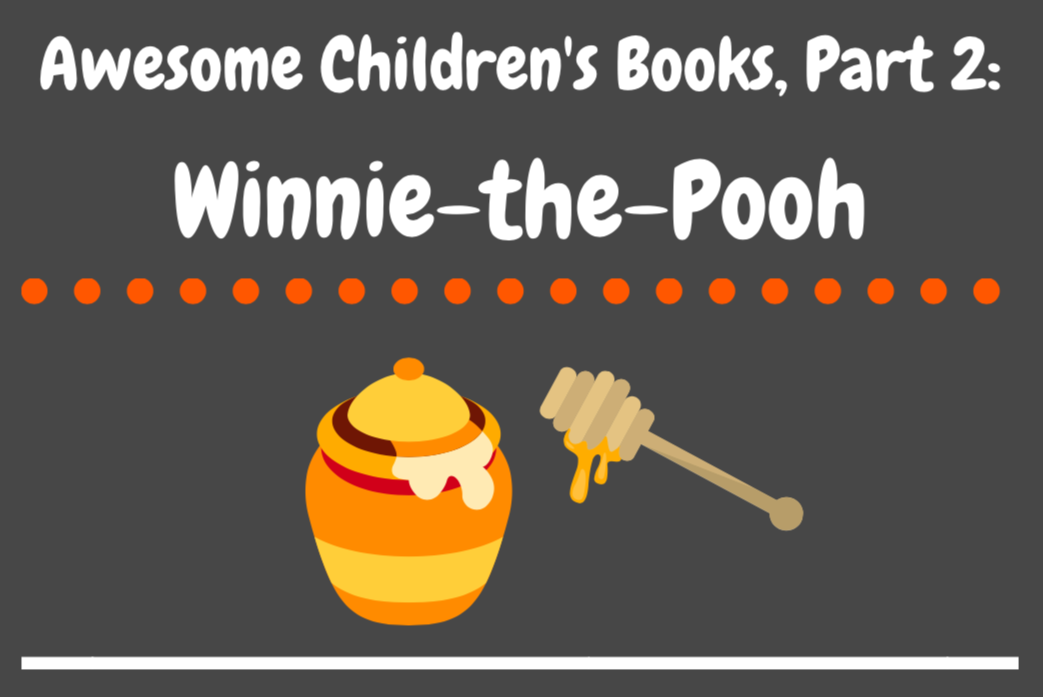Because everyone loves a good story
Awesome Children’s Books: Winnie-the-Pooh

We interrupt your regularly-scheduled series about the Hero’s Journey to bring you this vital, time-sensitive article about one of my favorite children’s books. Also, I needed another week to research the next Hero’s Journey post. It’s gonna be a good one.
As you may remember from my previous post about children’s books, I am a firm believer that a well-written children’s book is a delight not only to kids but to adults as well. An adult who turns up his nose at a good children’s book probably has lost a piece of himself that he would be better off having retained: a sense of fun, of wonder, of enjoyment in the small things, perhaps. More’s the pity.
The Magic of Pooh
Contrast this attitude with the feeling I hope you get when you read Winnie-the-Pooh, by British author A.A. Milne. Now, if your only experience with Pooh was watching the old cartoon or the recent movie, then you probably don’t have an adequate perspective on the charm of the books. See, the magic is in the telling.
The small, hardcover book that I am looking at right now was first published in England in 1926. I already love it for that fact alone. British writers from that era have a certain style and sense of humor that gets me every time. For example, Chapter One, “In Which We Are Introduced to Winnie-the-Pooh and Some Bees, and the Stories Begin,” is already off to a great start just because of the title itself. The chapter begins,
Here is Edward Bear, coming downstairs now, bump, bump, bump, on the back of his head, behind Christopher Robin. It is, as far as he knows, the only way of coming downstairs, but sometimes he feels that there really is another way, if only he could stop bumping for a moment and think of it. (1)
Christopher Robin requests that Milne tell a story—you know, because Winnie-the-Pooh wants to hear one—and so begins the first tale of Pooh’s quest for honey from a hive way up high in a tree. And, guys, I actually giggled out loud just now when I re-read how a tippy-top tree branch snapped out from under Pooh. You probably think I’m a cruel person now, but this is actually a great example of how the magic is in the telling.
[Pooh] was nearly there now, and if he just stood on that branch…Crack!
“Oh, help!” said Pooh, as he dropped ten feet on the branch below him.
“If only I hadn’t—” he said, as he bounced twenty feet on to the next branch.
“You see, what I meant to do,” he explained, as he turned head-over-heels, and crashed onto another branch thirty feet below, “what I meant to do—”
“Of course, it was rather—” he admitted, as he slithered very quickly through the next six branches.
“It all comes, I suppose,” he decided, as he said good-bye to the last branch, spun round three times, and flew gracefully into a gorse-bush, “it all comes of liking honey so much. Oh, help!” (2)
The Sweetness of Pooh
Now, maybe it is a little morbid of me to have enjoyed Pooh’s misadventure so much, but isn’t that delightful writing? It’s so understated, so wry and wonderful. But while he is charmingly funny, Milne also excels in sweet, simple observations such as children might say without realizing they’re profound. On one occasion, Pooh remarks,
“‘Well,…what I like best—’ and then he had to stop and think. Because although Eating Honey was a very good thing to do, there was a moment just before you began to eat it which was better than when you were, but he didn’t know what it was called.” (3)
I could go on and on, quoting sweet or quirky lines from Winnie-the-Pooh, but I think you’d be better served by picking up one of the books yourself. Read it to children, simply enjoy it yourself, or do both! But if you start to giggle out loud, don’t say I didn’t warn you.
Sources:
Milne, A.A. Winnie-the-Pooh. New York: E.P. Dutton, 1926. Chapter 1, p 3.
[Ibid] Chapter 1, p 9.
Milne, A.A. The House at Pooh Corner. New York: Dutton Children’s Books, 1994. Chapter 10, p 336.

Add a comment, and join the conversation!